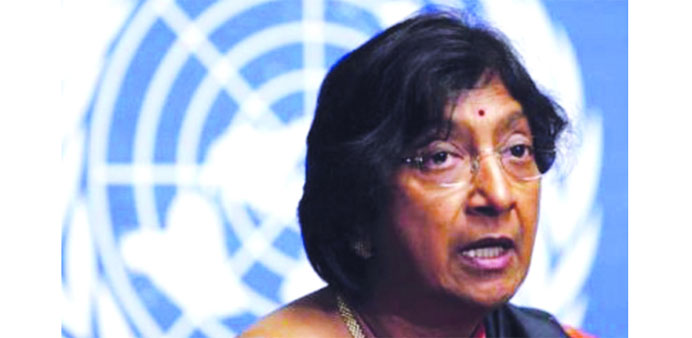Navi Pillay: "I am extremely concerned by Nepal regime's new attempt to introduce amnesties for serious human rights violations.”
Reuters/Kathmandu
Nepal would weaken the foundations of “genuine and lasting” peace after a decade-long civil war if it gave amnesties for serious crimes committed during the conflict, the top United Nations human rights official said.
Nepal, home to Mount Everest and birthplace of Lord Buddha, is still recovering from a brutal conflict that ended in 2006 in which more than 16,000 died, hundreds disappeared and thousands were wounded or displaced.
Last week, the government drafted a law to set up two panels Truth and Reconciliation Commission and the Commission on Disappeared Persons - as part of a peace deal that ended the conflict.
Navi Pillay, the UN High Commissioner for Human Rights, said the proposed legislation would grant powers to the truth panel to recommend amnesties for serious abuses, contrary to the core principles of international law.
“While I welcome steps taken by the government of Nepal to take the transitional justice process forward, I am extremely concerned by its new attempt to introduce amnesties for serious human rights violations,” Pillay said in a statement late on Monday.
She said the amnesty provisions in the bill, to be discussed by parliament this week, replicated those in an earlier law that was struck down by the Supreme Court in January.
“This process should be victim centred, depoliticised and should respect the right to a remedy and accountability through criminal prosecution,” Pillay said of the transitional justice system.
Government troops and Maoist rebels committed widespread atrocities including rape, torture, arbitrary arrests and unlawful killings during the insurgency, human rights groups say. No one has been prosecuted in a civilian court so far.
The government denies there is an amnesty plan in the draft and says any pardons would require the consent of victims.
Prisoners fall sick after New Year feast
Dhaka
At least 19 inmates of the Bagerhat district jail in Bangladesh have fallen sick due to food poisoning.
They were admitted to the Bagerhat Sadar Hospital yesterday, jail superintendent Md Amanullah said.
The inmates were down with diarrhoea after having “special food” on Monday on the occasion of Poila Baishakh, the first day of the Bangla New Year, bdnews24.com reported.
However, unofficial sources claimed the number of prisoners who fell ill could be higher.
They said the prisoners were served with traditional ‘panta bhat’ (watery rice and Hilsa), a popular dish combination taken on the first day of Bangla New Year. The inmates were provided with fried rice for dinner.
Amanullah, however, attributed the incident to a drinking water crisis in the jail.
He said the quality of food served had been good, but the prison lacked a safe source of water.
Kuheli Begum, resident officer of the hospital, said the patients were admitted to the diarrhoea ward.

